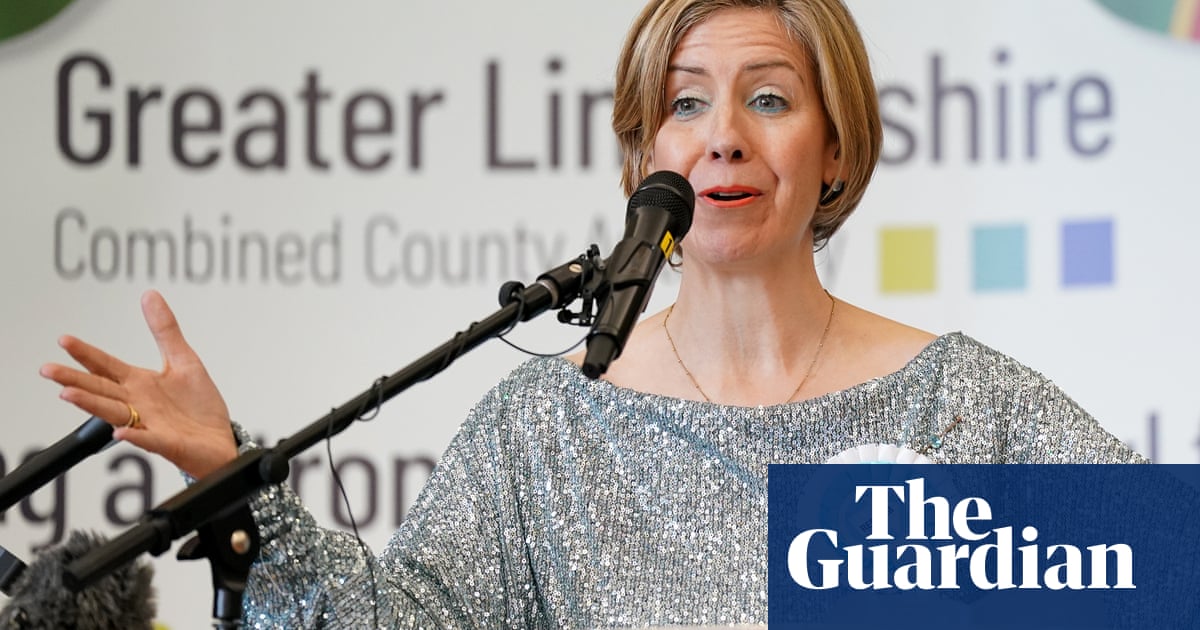Keir Starmer has been warned to “start listening” by a veteran Labour mayor after she fended off a challenge byReform UKon a night when Nigel Farage’s party made sweeping electoral gains.
The rightwing populist party won the Greater Lincolnshire mayoral race as the Reform candidate and former Conservative MP Andrea Jenkyns delivered a blow to her old party in one of its heartlands.
Jenkyns became the first elected mayor for the area with a majority of 40,000 over the Tories.
Reform was also ahead across the Humber in the Hull and East Yorkshire mayoralty, where the former Olympic boxer Luke Campbell had polled strongly.
Jenkyns lashed out at her rivals in a victory speech in which she claimed that she had been the target of “soul-destroying” dirty tricks.
“TheConservativescalled the police on me and implied I slept with political friends,” she said. “The campaign was also filled with irony as one of the candidates said I was parachuted in … she said this in her South African accent.”
Jenkyns, who had developed a reputation during her time on the Tory backbenches as one of the most rightwing MPs in parliament, also served notice of what her political priorities would be in a role where she will wield real power and preside over a budget, saying: “I say no to putting people in hotels. Tents are good enough for France. They should be good enough for people in Britain.”
The other candidates on stage walked off halfway through her speech, leaving her speaking into a microphone on her own.
Strong second place finishes by Reform for mayoral positions in Doncaster and in the West of England delivered a shock toLabour.
In Doncaster, where Labour’s Ros Jones won her fourth term as mayor with a majority of less than 700 votes after a close challenge by Reform, she criticised Starmer’s changes to the winter fuel allowance, rise in employers’ national insurance contributions and welfare reforms.
“I wrote as soon as the winter fuel allowance was actually mooted, and I said it was wrong, and therefore I stepped in immediately and used our household support fund to ensure no one in Doncaster went cold during the winter.”
The increase in national insurance was “hitting some of our smaller businesses” and the squeeze on the personal independence payment was leaving many people “worried”, Jones said.
She added: “I think the results here tonight will demonstrate that they need to be listening to the man, woman and businesses on the street, and actually deliver for the people, with the people.”
Labour won the West of England mayoralty in what could yet prove to be the best moment of the night for the party in a race where it had been expected to face stiff competition from the Green party.
However, in a surprise, it was Reform UK that pipped the Greens to second place in an area that has significant number of left-leaning voters.
Reform’s candidate was Arron Banks, the self-styled “bad boy of Brexit” and bankroller of one of the campaigns for Britain to leave the European Union, who polled 45,252 votes to the 51,197 of Labour’s Helen Godwin.
In Lincolnshire, Jenkyns said the results were a key staging post in Reform’s project to win the next general election.
“Reform is getting into places of power for the first time and we have to show we can deliver. We are going to be under scrutiny and if we can show what we can do then it will be a blueprint for government,” she told the Guardian.Jenkyns has promised “Doge Lincolnshire” to cut government waste – a reference to Elon Musk’s “department of government efficiency” in the US – and used the slogan “No to net zero madness” in her campaign.
